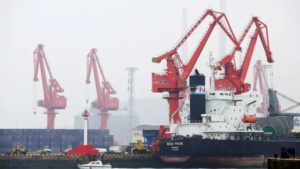 China is now fully part of the global energy trading system, regularly importing more than 9m barrels a day of oil and a rapidly growing amount of natural gas. But Beijing faces an American assertion of power that threatens to disrupt the current pattern of trade, not least in energy. The Chinese reaction could reshape markets we take for granted.
China is now fully part of the global energy trading system, regularly importing more than 9m barrels a day of oil and a rapidly growing amount of natural gas. But Beijing faces an American assertion of power that threatens to disrupt the current pattern of trade, not least in energy. The Chinese reaction could reshape markets we take for granted.
The first American action is direct: a war of competing tariffs on trade between the US and China. The second is indirect: the US sanctions against Iran that prohibit trade between third countries and Iran including trade in oil. Initially exemptions on such trade were granted to a number of countries including India and China, but in May the US began withdrawing those exemptions.
The tariff war is the subject of much bluster with threats and counter threats, but given the interests of both economies in maintaining an open trading relationship, it seems reasonable to expect that a deal will eventually be done. The issue is made more complex by the absence of any obvious mutually acceptable resolution of the question of Iran’s nuclear activity. Given that US president Donald Trump has rejected the multilateral agreement reached in 2015, it is difficult to see what, short of a full-scale regime change, will satisfy him and his national security adviser John Bolton.
Military action between the US and iran is possible, and even tighter sanctions are more likely. Seen from Beijing, the problem is that the principal loser from a conflict (in addition to the people of Iran) would be China itself. Chinese oil imports have risen rapidly during the past decade. The country may have 2.5m electric vehicles but it also has more than 300m registered vehicles running on diesel and petrol, along with an expanding internal air travel sector. Oil has become inseparable from economic activity and is essential to satisfying the consumer needs of China’s growing middle class.
Almost half — 44 per cent — of China’s oil imports come from the Middle East. As the US becomes ever more self-reliant in oil and gas thanks to the shale revolution, the natural destination for Middle East oil is Asia rather than America. If Iran’s oil trade is cut off — either by sanctions or by a physical conflict that closes the Strait of Hormuz — China will be among the first to feel the implications. Energy security is now a Chinese issue.
In the short term, China is likely to buy any oil it needs, which would no doubt force up world prices. The country’s imports unexpectedly rose to more than 10m barrels per day in April, presumably to boost stocks ahead of any crisis, and this almost certainly helped strengthen world prices.
Source: “Is China about to Change the Global Oil Trade?”, Financial Times
